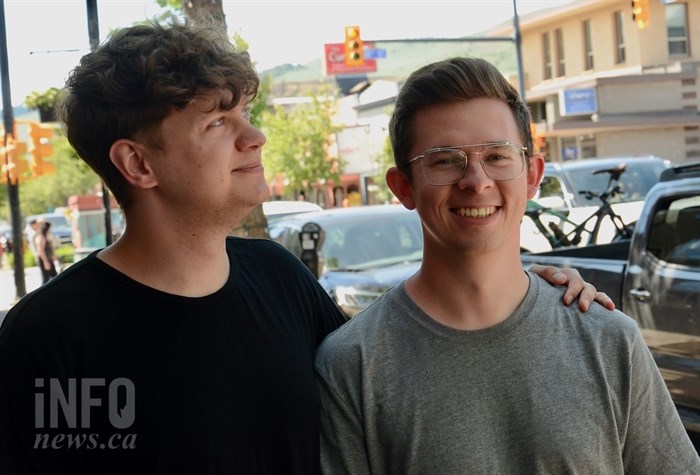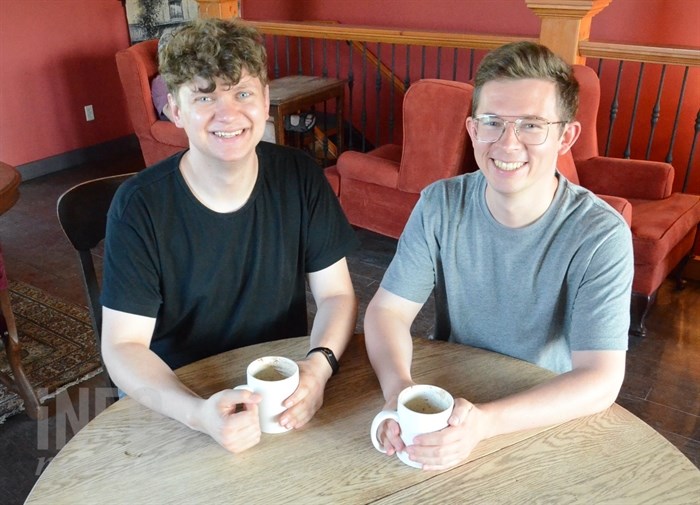
Mykola 'Mike' Zrazhevskyi and Maksym 'Max' Yenin.
(BEN BULMER / iNFOnews.ca)
June 11, 2022 - 7:00 AM
Mykola Zrazhevskyi and Maksym Yenin spent three weeks walking around the war-ravaged Ukrainian town of Mariupol looking for a way to flee the city they both called home.
Some days they walked for six or seven hours before returning to the apartment that they shared.
They stopped at friends' homes and at shelters where they picked up food and water, along with vital information.
"During the war, there is an information war," Zrazhevskyi said. "Officials said that we were not able to leave Mariupol... I don't know, were they right or were they wrong?”
The two friends walked as a way to find out information.
"Every day we woke up and walked from one place to another place as we wanted to make sure that some of our friends and relatives were safe," Zrazhevskyi said. "That's why we walked to see what was going on in other districts, to decide what we had to do next. During the war it is really important not to stay in one place, as you don't get the information, you don't know what is going on around."
They stopped returning to their apartment after a nearby building was destroyed in a bombing.
They made their way to a safer part of the city of roughly 450,000 people and stayed with a friend.
"Of course, you can understand what we saw and what we heard and what we felt as the war was in the process, and there was fighting between Russian and Ukrainian armies," Zrazhevskyi said.
But he's wrong. Unless you've experienced it, no one can fathom what it's like to walk through a war zone trying to find a way out. For your average Canadian it's incomprehensible.
Zrazhevskyi relays the story over a cappuccino in a Vernon cafe. He looks younger than his 27 years and is cheerful as he relays his story in excellent English.
He explains that in Ukraine people have a Ukrainian name and a Russian name, but here in Canada there are going by Nick and Max.
He does most of the talking, while Yenin, 31, chips in on occasion.
The two friends met at university in Mariupol a decade ago, then shared an apartment and ran a graphic design and illustration business together.
This was all before they lost everything when Russia invaded Ukraine on February 24.
But on the actual day of the invasion, nothing much changed.
"When Feb. 24 came and people heard bombing, people just woke up and went to work, nobody paid attention at all," Zrazhevskyi said. "That might sound really strange and unbelievable but people can get used to hearing bombing sounds."
Living so close to the Donbas region, which has been under Russian-backed control since 2014, the sound of bombing wasn't unusual.
However, on Feb. 24 they both took the situation more seriously.
Zrazhevskyi cancelled his appointments and they both packed what Ukrainians nicknamed a "worry bag."
They thought to go to Yenin's parents who live in the Donbas region, already under Russian control.
READ MORE: Escaping from ‘hell to heaven,’ Ukrainian refugee recounts survival and arrival to Kelowna
That's when they started their daily walks trying to figure out a way to leave the city.
Along with bombing and fighting, they also had to deal with looters – normally armed, often violent, and always drunk. The Ukrainian police had stopped responding after the first few days of the war.
While buses were leaving the city, only two or three would leave each day, and women, children, and the elderly took priority.
They had to wait their turn in a queue of around 200,000 people also eager to leave.
While a friend had a car, there was no gas to be bought anywhere.
However, three weeks later, which much of the city now in Russian control, they made it out.
Travelling by car, they headed to Berdyansk before then heading to stay with friends in Crimea.
They realized their hope of travelling to Western Ukraine wasn't possible.

Nick and Max.
(BEN BULMER / iNFOnews.ca)
While their friends in Crimea offered food and shelter, it couldn't be a long-term plan. Their thoughts turned to Canada.
Yenin's uncle emigrated to Vernon almost 30 years ago and offered them a place to stay.
All they needed was a Canadian visa centre, but there wasn't one they could access.
Friends from Georgia contacted them. Zrazhevskyi clarifies he's talking about the country, not the U.S. state.
"They are Russians actually, but they are very kind," he says.
They both travelled for another two days before arriving in the safety of Georgia.
READ MORE: Ukrainian refugees continue settling in Okanagan
While Ukrainian men over 18 years old are not allowed to leave the country, everywhere that Zrazhevskyi and Yenin travelled through was under Russian control, making the Ukrainian law obsolete.
After one month in Georgia and a visit to the Canadian visa centre complete, they boarded a plane to Toronto.
Two-and-a-half days later they stepped foot on Canadian soil.
"We didn't know what to feel, we were exhausted," Zrazhevskyi replies when he's asked how it felt to finally get here.
"We met so many kind, helpful, friendly, people who really want to help, who want to understand what is happening," he says. "It's really inspiring."
The pair have launched the company they ran in Ukraine here, and even managed to snag a couple of paying clients.
"But we have to find more clients," Zrazhevskyi says.
While both Zrazhevskyi and Yenin smile and laugh and chat and talk about an optimistic future in Canada, there's no escaping what they left behind.
Zrazhevskyi's family lives in the Donbas region under Russian control, while Yenin's family lives in a "grey zone" where there is a lot of fighting.
"It isn't safe in Donbas region from both sides... and civilians are dying from both sides every day," he says.
Phone lines are unstable and Yenin says his parents have no reception when they are sheltering in a bunker.
"We can express peace and calm but sometimes we don't feel it," Zrazhevskyi says. "(Our) emotional state is quite unstable... we pretend very well... we can smile but sometimes we don't want to smile."
It's hard to fathom how they cope knowing their families are living firsthand through a war.
"Sometimes we wake up in the morning and understand that everything that we had before has gone, and it might not come back.”
It’s a very sobering statement.
They both express their sincerest gratitude to those who have helped them out and list of names and organizations from the Slavic United Network to the Vernon and District Immigrant Services Society and NexusBC.
They are both still living with Yenin's uncle who has his own family and eight children and will have to move.
Zrazhevskyi says a lot of people in Mariupol had lost hope and would ask them why they were walking around the city each day trying to find a way to leave.
He said they just had to hang on to hope. And they are trying their hardest to hang on to the attitude that got them out of a war-ravaged city to make a new life in Vernon.
Their graphic design business can be found here.
READ MORE: ESCAPING WAR: Ukrainian family grateful to Canada after arrival in Vernon
To contact a reporter for this story, email Ben Bulmer or call (250) 309-5230 or email the editor. You can also submit photos, videos or news tips to the newsroom and be entered to win a monthly prize draw.
We welcome your comments and opinions on our stories but play nice. We won't censor or delete comments unless they contain off-topic statements or links, unnecessary vulgarity, false facts, spam or obviously fake profiles. If you have any concerns about what you see in comments, email the editor in the link above.
News from © iNFOnews, 2022